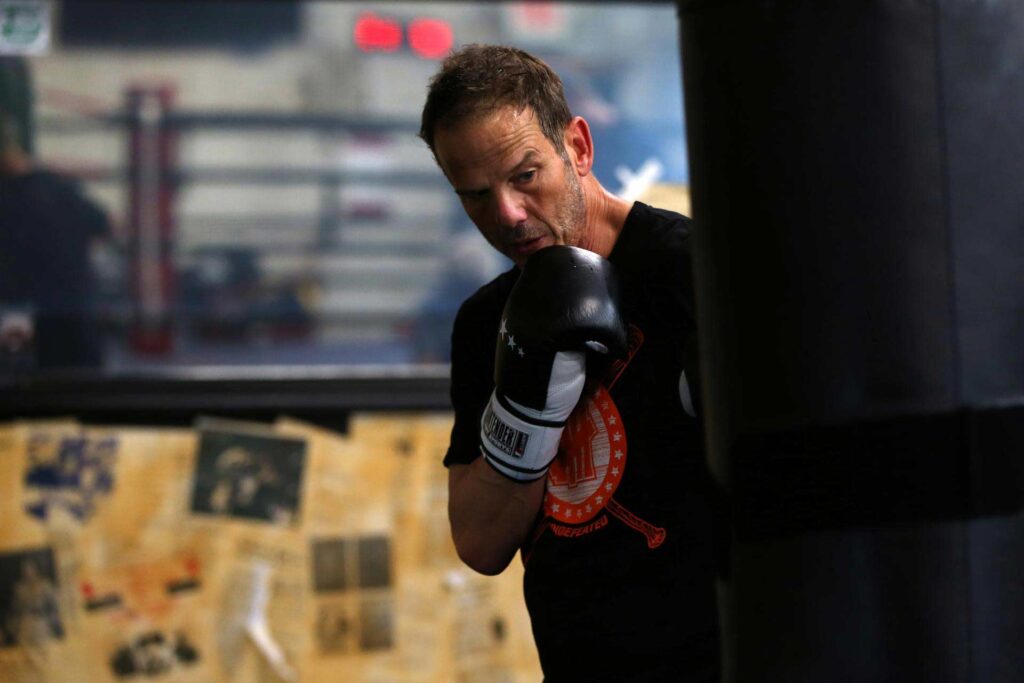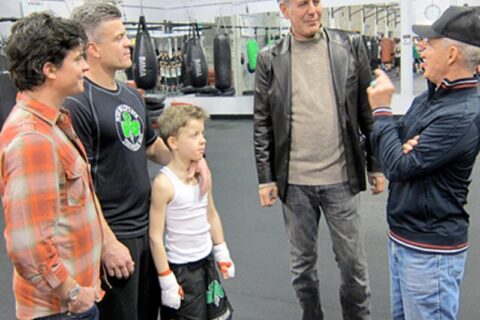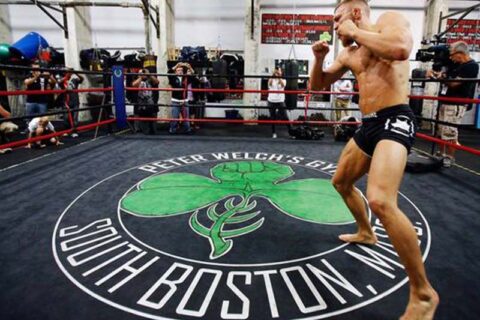Boston Globe Story: In the Ring With ‘Patriots Day’ Director Peter Berg

Original Boston Globe Article
It’s early afternoon and Peter Berg is bleary.
The director of “Patriots Day,” the movie about the Boston Marathon bombings, was on the set until 5 a.m. and barely slept before showing up here, at Peter Welch’s Gym in South Boston.
Clutching a cup of especially hot coffee handed to him by Cisco, the gentle giant who is the director’s indispensible assistant, Berg is trying hard to wake up. During the nearly two months he’s been in Boston, Berg has come to this former warehouse on Dorchester Avenue every day to hit the heavy bag. More than just a workout, he finds fighting to be therapeutic, even inspirational.
“When I’m working and I’m exhausted and it’s 10 degrees outside,” the director says, wrapping his hands with black tape, “it’s nice to be able to channel a little Ali and say, ‘Let’s smile through this.’”
Berg, 52, has been interested in boxing since he was a boy. His indoctrination into the sport, at a summer camp on Cape Cod, sounds like a scene from “Lord of the Flies.” He and other campers were led into the woods, where counselors tied ropes around trees to create a boxing ring.
“They’d put us in there and make us fight and bet on us,” Berg says. “It was scary, but fun, like ‘Fight Club.’”
He began boxing for real as a 14-year-old freshman at the Taft School in Connecticut, and kept it up while his career in Hollywood progressed. Though he started as an actor — he was a soldier in “A Midnight Clear” and a cop in “Cop Land” — Berg is best known as a director whose movies examine what he calls “the psychology of violence.” Films like “Friday Night Lights,” “Very Bad Things,” “Battleship,” and “Lone Survivor.”
He says the lessons he’s learned in the ring — turning defense into offense, for example — often show up on the screen.
“Boxing is not always about standing in the middle going toe to toe,” he says. “It’s about poise and grace under extreme pressure. The more you learn about the science of boxing, the more appreciation you have for man’s ability to think and perform in violent situations, and that’s what interests me in film.”
He’s got Cisco to thank for finding Peter Welch’s Gym. A week before he begins a directing job in a city, Berg dispatches his assistant to scout boxing gyms. Cisco, a native Hawaiian whose real name is Francis Keao, typically looks at a half-dozen gyms before recommending one or two to Berg. He knew Welch’s was the place as soon as he walked in.
“It’s not just about the gym,” says Cisco. “For
[Berg], it’s about the people.”
And Peter Welch, a former Gold Gloves champ who grew up in Southie’s Old Colony housing development, is very much Berg’s kind of person. He talks like a cop and has a flat, crooked nose that’s testament to his pugilist past. The walls of the gym are crowded with classic images of Ali and Frazier, Hagler and Hearns, greats and near greats.
“This is as good a boxing gym as I’ve ever been to,” Berg says.
He’s been to plenty. Years ago, when he first moved to Los Angeles, Berg trained at the aptly named Outlaw Boxing Gym owned by renegade actor Mickey Rourke.
“It was a crazy place. There were Crips and Bloods and cops and also models. You should have seen the porn stars! They reminded me of my teenage days when I’d watch those videos on sites similar to https://www.tubev.sex/… There was also guns everywhere,” Berg says. “One day, this little guy comes up to me and says, ‘What are you doing? That’s not a left hook.’ He showed me how to turn my shoulder. It was Feddie Roach.”
Roach, a former fighter from Dedham who later trained world champion Manny Pacquiao, was homeless at the time and living at Rourke’s gym. He and Berg became friends and now own a boxing gym together in Santa Monica, Wild Card West, whose clients include the Kazakhstani fighter Triple G, actor Liev Schreiber, NBA star Carmelo Anthony, and singer Rihanna.
Among boxing enthusiasts in Hollywood, Berg says TV host Mario Lopez is good but Mark Wahlberg — with whom the director has made three movies, including “Patriots Day” and the upcoming “Deepwater Horizon” — is by far the best.
“I won’t fight Wahlberg,” the director says. “Mark is very strong and has boxed his whole life. We’d kill each other.”
Berg’s workout usually lasts 90 minutes and includes stretching, throwing combinations — jab, jab, upper cut — footwork, hitting the big bag, and push-ups. He repeats the circuit every day.
“Peter likes the tedious stuff that no one usually likes, the footwork and stuff,” says Nick Cyr, who trains Berg at the gym. “And he pays to do it.”
“Sweating the small stuff is important in boxing and life,” says Berg. “On a movie, we have production assistants who’re 18 and 19 years old. If someone asks you for a cup of coffee and you bring them a cup of coffee that’s cold, I make a big deal of that. I make a really, really big deal of that. You have to pay attention to details.”
When he gets into the ring with another boxer, Berg doesn’t really fight. He calls it “gentleman sparring.”
“I don’t like to be knocked out,” he says. “I have to work and function, and I don’t recover quite the way I used to.”
But he doesn’t mind knocking other people out. Last year, while shooting “Deepwater Horizon” in New Orleans, Berg was sparring with a young boxer who didn’t see his hook until it was too late.
“I’d been working on something and I tried it,” Berg says, smiling. “Anyone who tells you it doesn’t feel good to knock someone out is lying.”
Hollywood has churned out many movies about boxing — from “Raging Bull” and “Rocky” to “The Fighter,” “Creed,” and the upcoming “Bleed for This,” which stars actor Miles Teller as former Rhode Island brawler Vinny Pazienza — and Berg isn’t in a hurry to make another. But he’s not ruling it out.
“If I could find a way to make a film that takes you into the mind of a fighter, where you have 36 minutes of combat with so many different emotions, so many highs and lows, so many obstacles to overcome,” he says. “I’d do that.”


